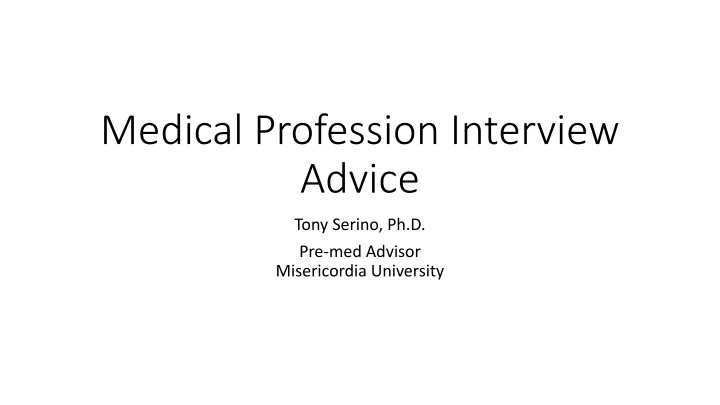
Successful Medical Profession Interview Advice and Preparation Tips
Get valuable insights on acing your medical profession interview, including advice from an experienced pre-med advisor. Learn about essential pre-interview preparation, what med schools assess during interviews, interview mechanics, and tips for making a lasting impression during the interview.
Download Presentation

Please find below an Image/Link to download the presentation.
The content on the website is provided AS IS for your information and personal use only. It may not be sold, licensed, or shared on other websites without obtaining consent from the author. If you encounter any issues during the download, it is possible that the publisher has removed the file from their server.
You are allowed to download the files provided on this website for personal or commercial use, subject to the condition that they are used lawfully. All files are the property of their respective owners.
The content on the website is provided AS IS for your information and personal use only. It may not be sold, licensed, or shared on other websites without obtaining consent from the author.
E N D
Presentation Transcript
Medical Profession Interview Advice Tony Serino, Ph.D. Pre-med Advisor Misericordia University
Actual Successful candidates advice: It s a conversation. They want to know you as a person. The more you reveal about yourself, weaving life experiences into the conversation, the more you ll stand out. Show your enthusiasm for the profession but in a controlled, thoughtful way.
Essential Pre-interview Preparation Know yourself: your strengths and weaknesses, skills, and personal values Prior to interviews, think about your weaknesses and how you overcame then allowing you to grow as a person. Know about current issues in the profession Know about the school your are applying to: what are they known for, what accomplishments have occurred -develop questions about the program
Med schools are assessing at the interview: Your understanding of the career. What is the role of MD, DO, DDS, etc. vs other health professionals? How are they alike or different? Your motivation to the career and your level of maturity and judgement. Knowledge of current events affecting health care. Your ability to empathize with people from various cultural and ethnic backgrounds. Your ability to think logically and analytically. Your emotional stability, intellectual curiosity, communication skills, work ethic, and your personal integrity and honesty Your flexibility/adaptability, self-confidence and leadership ability Be able to give personal examples of experiences that demonstrate these qualities.
Interview Mechanics Prep Dress appropriately (business attire) give outfit a dry run before the interview to test comfort level Think about personal hygiene and grooming (don t be scruffy). Be moderate with cologne and jewelry. Confirm time of interview and get accurate directions, get there EARLY! Call if you are going to be late, but Don t Be Late! Have a copy of your application Plan on arriving at the office at least ten minutes early. Turn off cell phone, do not bring in drinks unless one is offered. Keep up with current events and medical issues in the world
During Interview Make First Impression: solid handshake, eye contact, small talk, smile and say the person s name as you are introduced to remember it. Maintain proper body language (relaxed yet attentive posture) Do not slouch. Try to speak clearly (this should be practiced prior to the actual interview) Listen to the question, pause to consider your response (ask for clarification as necessary) Be honest in your answers. Use full sentences and use your own experiences and knowledge to back up your answers.
During the Interview Questions will be open ended, your answers should be focused and relevant to that question Again use specific examples to back up your answer (but don t meander), be succinct, persuasive and enthusiastic in your response. Talk about challenges you have dealt with successfully in the past to back up your answers about yourself. You are interviewing them to see if you will be successful in their program so have your own questions about their facility and program.
Do NOT: Do NOT: Give one word answers Talk over the top of the interviewer or other interviewees in group setting Give overly rehearsed answers (this is really obvious during the interview), especially giving one of these rehearsed speeches to a question that has not really been asked. Do not be chummy Sit still (no leg bobbing, or nervous hands) you want the interviewer to focus on what your are saying not your extraneous body movements.
Aftermath and Follow-up Immediately after the interview (back at you car, for example) write down your impressions of what you think went right or wrong Get the names (or business cards) of the people that interviewed you. The next day send a thank you note for the opportunity. If there is something positive you would like to highlight mention it in the note. Mail the note immediately. Improve your skills by reviewing your performance Use www.aamc.org website to review current medical issues, see interview techniques, etc.
